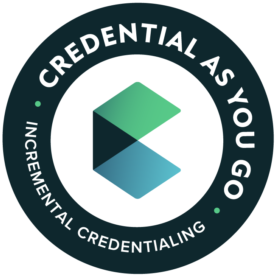Credentialing—including degrees, certificates, microcredentials, badges, and other types of incremental credentials—is a hot topic in graduate/professional education across the country and globally. The field is in flux, with many promising explorations and innovations underway. The potential benefits from this work may be significant, such as:
Yet higher education institutions which are the driving force for change (especially the faculty) still hold various perspectives regarding the growing array of nondegree credentials. Many higher education institutions are hesitant to offer incremental credentials at the graduate and professional level—for many reasons discussed in this Playbook.
As higher education institutions and others continue their research and experimentation in incremental credentialing, we can expect it to grow. But that growth will likely occur in a tumultuous environment. Questions about the adequacy of traditional academic measures of quality such as enrollment and completion; greater emphasis on employer satisfaction and career outcomes; questions about whether shorter-term credentials are better as stand-alone entities or subsumed within a degree; federal Gainful Employment Requirements that will demand evidence; and the rising costs of graduate and professional education.
To respond to these changes in such a climate, institutions will need to market a wider array of credentialing options and reach out to students who are not aware of them. As awareness grows and more institutions embrace multiple credentialing pathways, learners are likely to gravitate to these opportunities, especially if return-on-investment data demonstrates that there is value in credentials beyond degrees, or in hybrid degrees which couple short-term credentials with degrees.
As they look to this future, graduate-level educators should consider a number of key questions that can guide their planning:

Credential As You Go has acquired three phases of funding to date. Lumina Foundation funded Phase I, resulting in the Incremental Credential Framework for testing. The Institute of Education Sciences, U.S. Department of Education funds Phase II (Grant R305T210063), which focuses on rapid prototyping of and research on incremental credentials with a national campaign. An anonymous private donor fund at the Program on Skills, Credentials & Workforce Policy at George Washington University funds the development of the prototype Learn and Work Ecosystem Library. Walmart funds Phase III, which focuses on systems change for expansion and sustainability of incremental credentials. The opinions expressed are those of the authors and do not represent views of Lumina Foundation, Institute of Education Sciences, the U.S. Department of Education, Walmart, or George Washington University.